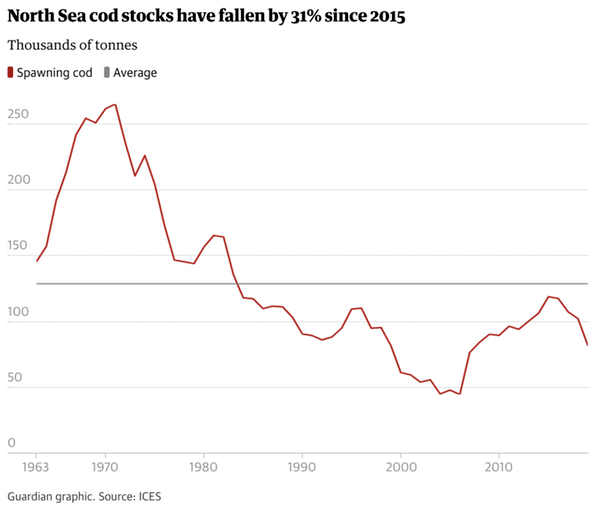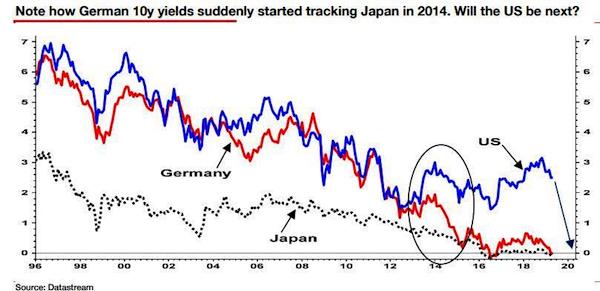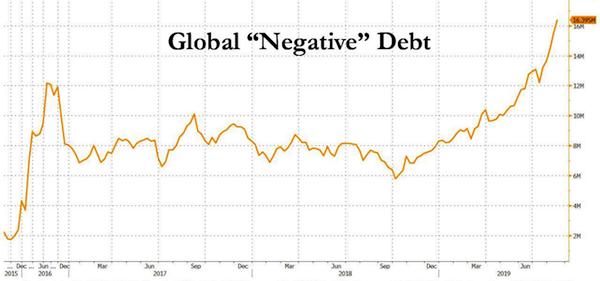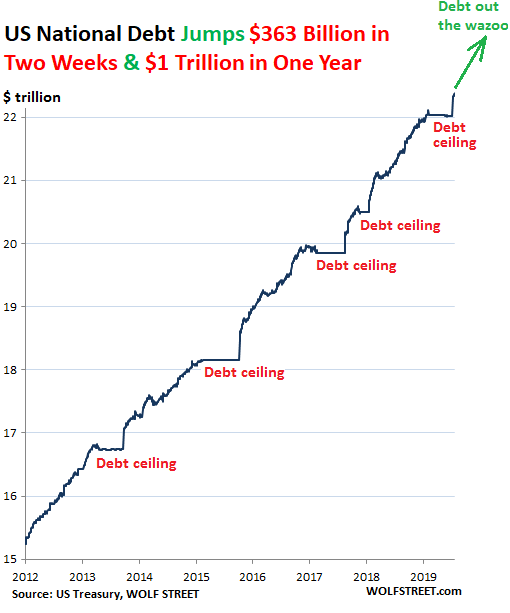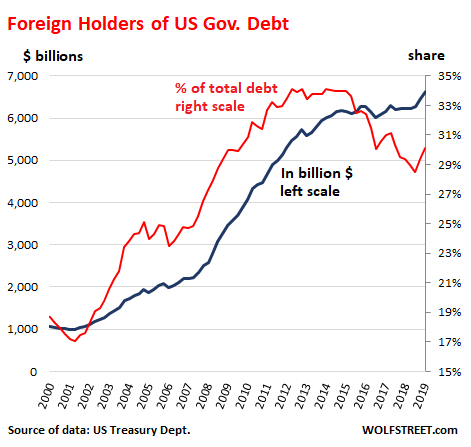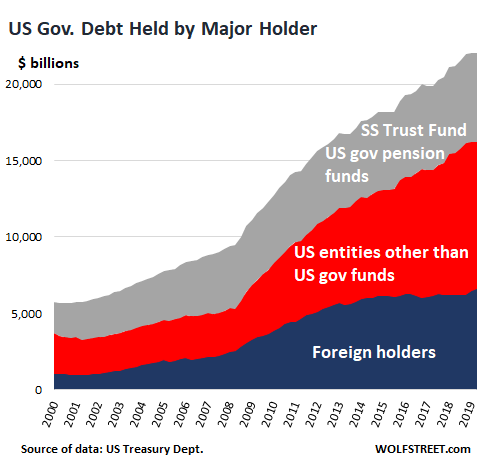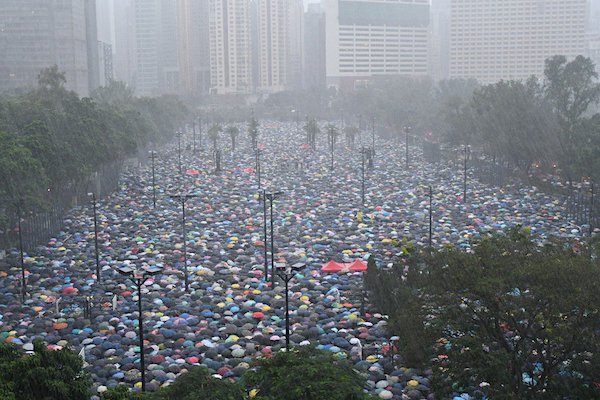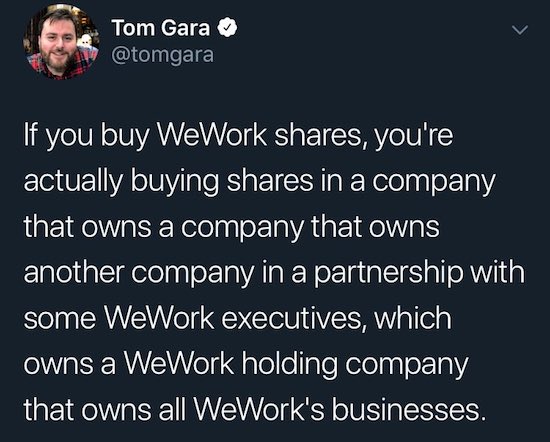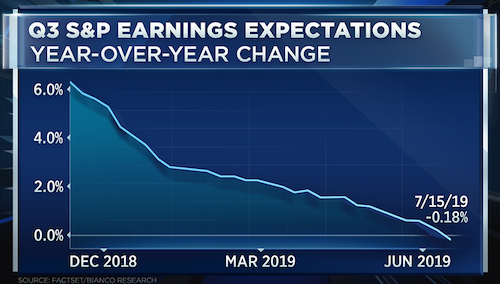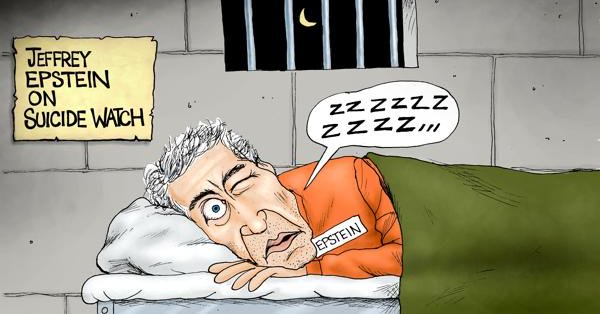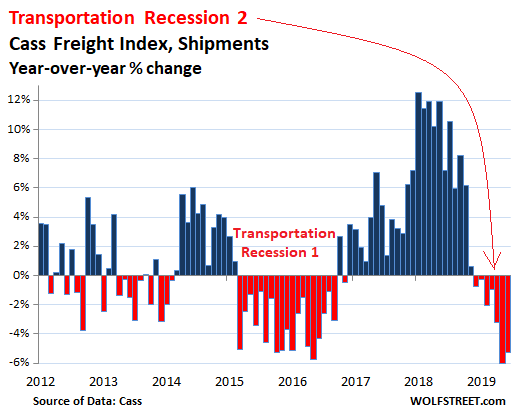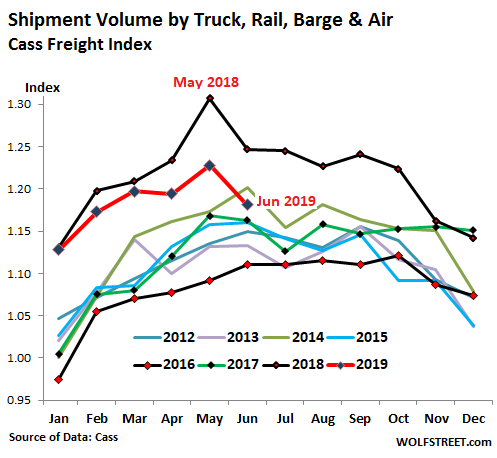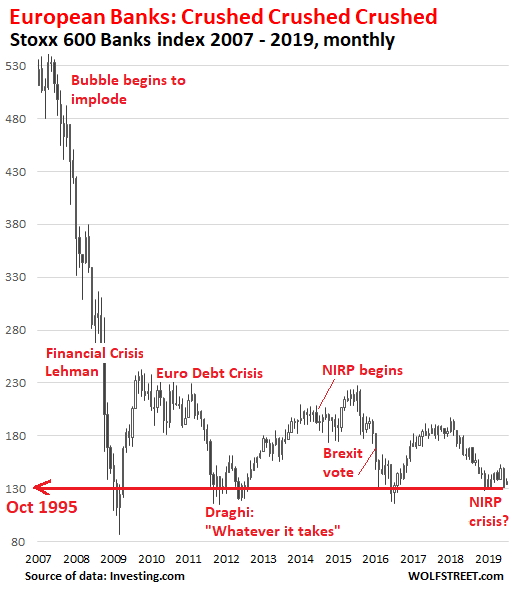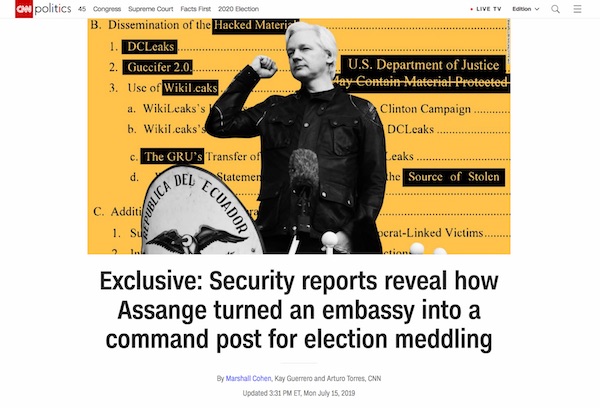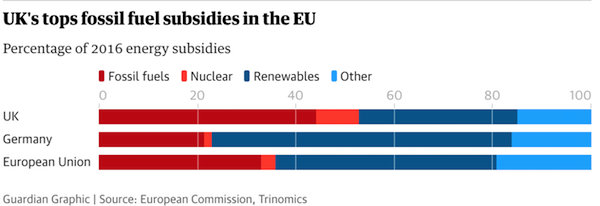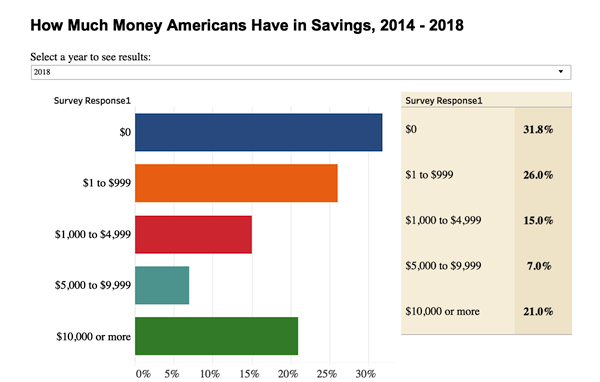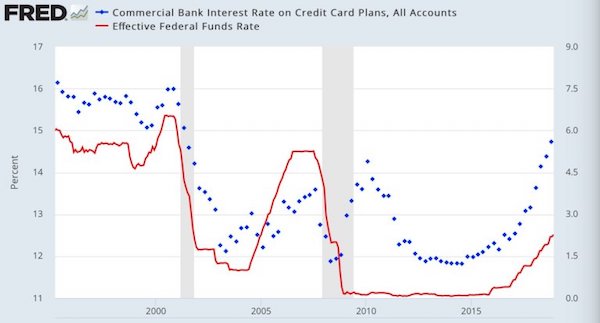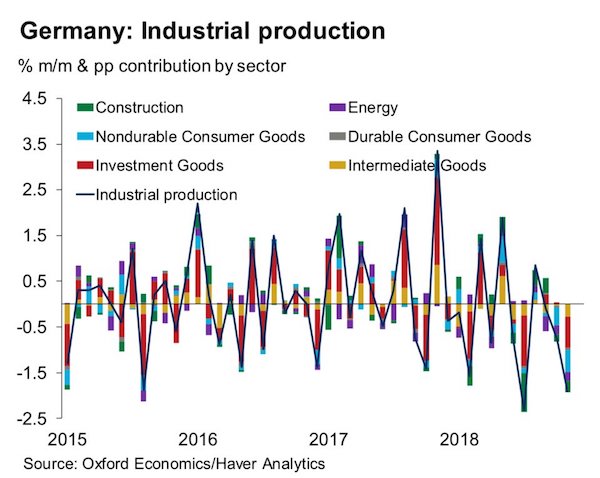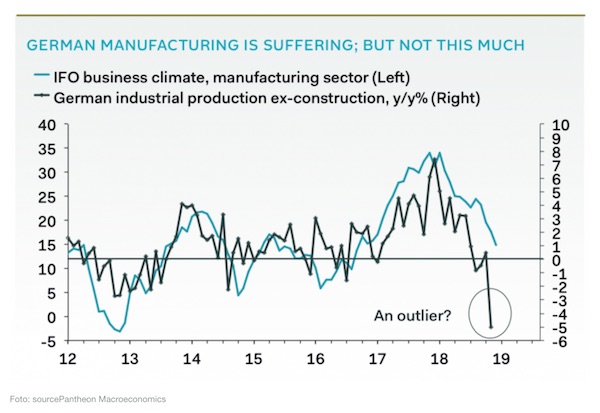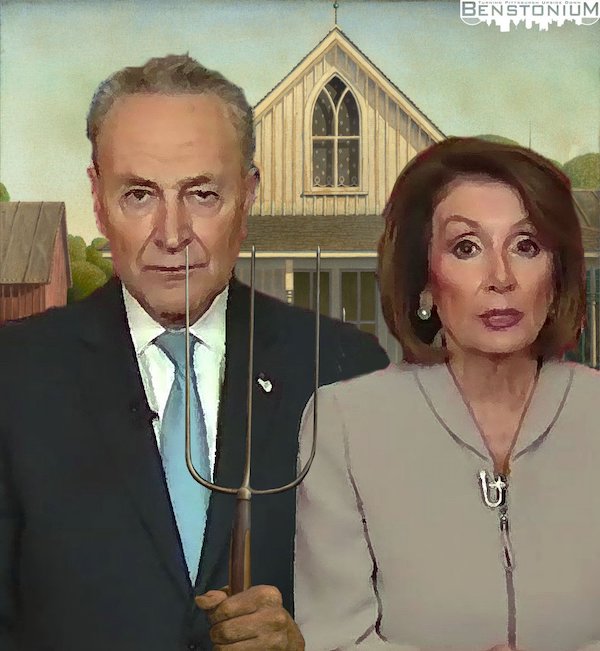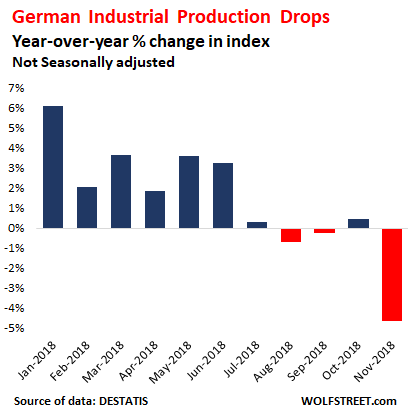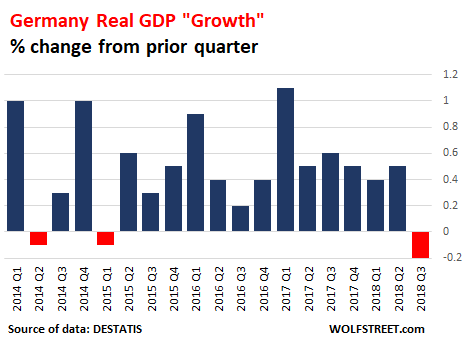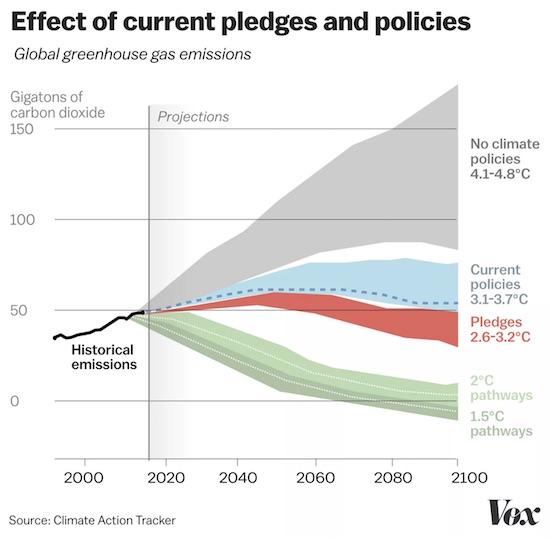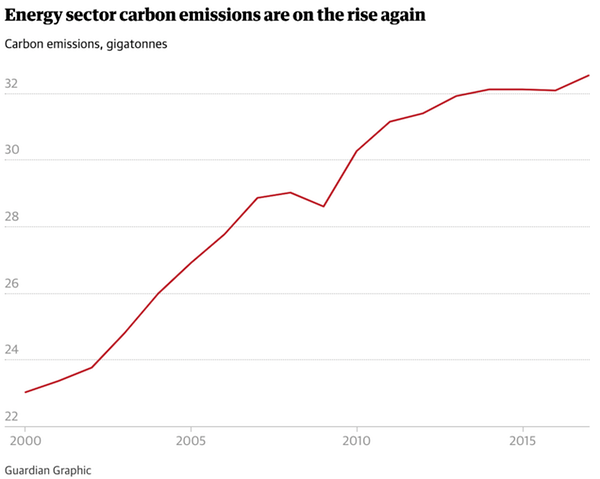
Paul Gauguin The Seine at the Pont d’Iena 1875

“..21% of Republicans said a recession will likely happen within a year, while 74% of Democrats said a recession is coming..”
• Half of Americans Expect A Recession To Hit In The Next 12 Months (MW)
There are more Americans expecting an economic downturn now than there were just before the start of the Great Recession. A Gallup poll released Friday painted a gloomy picture: people are becoming increasingly pessimistic about the economy and bracing for a recession. • 49% of poll participants said a recession will likely arrive in the next 12 months. In October 2007 — two months before the Great Recession began — 40% of poll participants felt the same way. • For the third straight month, a growing share of Americans said the economy is deteriorating, going from 37% in July to 48% in September. At the same time, fewer people said it’s improving, slipping from 54% to 46%. • Republicans are rosy and Democrats are downbeat: 21% of Republicans said a recession will likely happen within a year, while 74% of Democrats said a recession is coming in that time. Independents were evenly split.
Gallup noted it conducted the poll from September 3 to 15, as the latest round of Chinese tariffs took effect, but before the latest interest rate cut. Consumer perceptions weren’t totally glum. Though 49% of people told Gallup a recession is either fairly likely or very likely, another 50% said a recession isn’t too likely, or not likely at all. After all, there’s still a record-breaking 10-year bull market and a 3.7% unemployment rate, which is around a 50-year low. Like consumers, market experts are also divided. Some brush off recession talk, but others say a downturn will happen by the end of 2020.

“If in fact negative interest rates can occur naturally, without central bank or state interventions, then economics textbooks need to be revised on the quick.”
• Negative Interest Rates Are The Price We Pay For De-Civilization (Deist)
“Calculation Error,” which Bloomberg terminals sometimes display, is an apt metaphor for the current state of central bank policy. Both Europe and Asia are now awash in $17 trillion worth of negative-yielding sovereign and corporate bonds, and Alan Greenspan suggests negative interest rates soon will arrive in the US. Despite claims by both Mr. Trump and Fed Chair Jerome Powell concerning the health of the American economy, the Fed’s Open Market Committee moved closer to negative territory today — with another quarter-point cut in the Fed Funds rate, below even a measly 2%.
Negative interest rates are just the latest front in the post-2008 era of “extraordinary” monetary policy. They represent a Hail Mary pass from central bankers to stimulate more borrowing and more debt, though there is far more global debt today than in 2007. Stimulus is the assumed goal of all economic policy, both fiscal and monetary. Demand-side stimulus is the mania bequeathed to us by Keynes, or more accurately by his followers. It is the absurd idea, that an economy prospers by consuming and borrowing instead of producing and saving. Negative interest rates turn everything we know about economics upside down.
Under what scenario would anyone lend $1,000 to receive $900 in return at some point in the future? Only when the alternative is to receive $800 back instead, due to the predicted interventions of central banks and governments. Only then would locking in a set rate of capital loss make sense. By “capital loss” I mean just that; when there is no positive interest paid, the principal itself must be consumed. There is no “market” for negative rates. The future is uncertain, and there is always counterparty risk. The borrower might abscond, or default, or declare bankruptcy. Market conditions might change during the course of the loan, driving interest rates higher to the lender’s detriment. Inflation could rise higher and faster than the agreed-upon nominal interest rate. The lender might even die prior to repayment.
Positive interest rates compensate lenders for all of this risk and uncertainty. Interest, like all economics, ultimately can be explained by human nature and human action. If in fact negative interest rates can occur naturally, without central bank or state interventions, then economics textbooks need to be revised on the quick. Every theory of interest contemplates positive interest paid on borrowed capital. Classical economists and their “Real” theory say interest represents a “return” on capital, not a penalty. Capital available for lending, like any other good, is subject to real forces of supply and demand. But nobody would “sell” their capital by giving the buyer interest payments as well, they would simply hold onto it and avoid the risk of lending.

150,000 Brits stranded, as are 140,000 Germans. 50,000 stranded in Greece alone.
• British Travel Firm Thomas Cook Collapses, Stranding 600,000 Tourists (R.)
Thomas Cook, the world’s oldest travel firm, collapsed on Monday, stranding hundreds of thousands of holidaymakers around the globe and sparking the largest peacetime repatriation effort in British history. Chief Executive Peter Fankhauser said it was a matter of profound regret that the company had gone out of business after it failed to secure a rescue package from its lenders. The UK’s Civil Aviation Authority (CAA) said Thomas Cook had now ceased trading and the regulator and government would work together to bring the more than 150,000 British customers home over the next two weeks. “I would like to apologise to our millions of customers, and thousands of employees, suppliers and partners who have supported us for many years,” Fankhauser said in a statement released in the early hours of Monday morning.
“It is a matter of profound regret to me and the rest of the board that we were not successful.” The government and aviation regulator said that due to the scale of the situation some disruption was inevitable. “Thomas Cook has ceased trading so all Thomas Cook flights are now cancelled,” the CAA said. The demise of Thomas Cook marks the end of one of Britain’s oldest companies that started life in 1841 running local rail excursions before it survived two world wars to pioneer package holidays first in Europe and then further afield. The firm now runs hotels, resorts and airlines for 19 million people a year in 16 countries. It currently has 600,000 people abroad, forcing governments and insurance companies to coordinate a huge rescue operation.

Who are UK firms/factories going to sell their cars to?
• No-Deal Brexit Will Have ‘Seismic’ Impact – European Car Industry (G.)
The European car industry has warned of catastrophic effects of a no-deal Brexit, saying it would have a “seismic” impact on making cars in Europe. In a rare joint statement, chiefs from 23 automotive business associations across Europe joined forces to caution against a brutal exit from the bloc by Britain, where auto giants BMW, Peugeot PSA and Japan’s Nissan have factories. “Brexit is not just a British problem, we are all concerned in the European automotive industry, and even further,” said Christian Peugeot, head of French automotive industry association CCFA in the statement.
Reaping the benefits of the EU’s single market, carmakers have supply chains that criss-cross the English Channel and Britain is the destination of around 10% of vehicles assembled on the continent, according to industry data. British prime minister, Boris Johnson, has rattled nerves with his vow to leave the European Union on 31 October come what may – with or without a trade deal with Brussels. “The UK’s departure from the EU without a deal would trigger a seismic shift in trading conditions, with billions of euros of tariffs threatening to impact consumer choice and affordability on both sides of the Channel,” the joint statement said.
A chaotic Brexit would land a “severe” blow against the industry’s just-in-time supply chains that stretch across international borders and depend on zero administrative hassle, the associations warned. “The EU and UK automotive industries need frictionless trade and would be harmed significantly by additional duties and administrative burden on automotive parts and vehicles,” said Bernhard Mattes, the head of Germany’s auto lobby VDA.

Catch 22: tell the world everything will be fine in no time, but without causing prices to plummet.
• Oil Set To Spike As Saudi Repairs At Abqaiq May Take “Up To Eight Months” (ZH)
[..] the WSJ reported that it may take “up to eight month”, rather than 10 weeks company executives had previously promised, to fully restore operations at Aramco damaged Abqaiq facility, suggesting the crude oil shortfall will last far longer than originally expected. The official reason for the delay: the supply-chain is unable to respond to the Saudi needs. Specifically, Aramco is” in emergency talks with equipment makers and service providers, offering to pay premium rates for parts and repair work as it attempts a speedy recovery from missile attacks on its largest oil-processing facilities.” Following a devastating attack on its largest oil-processing facility more than a week ago, Aramco is asking contractors to name their price for patch-ups and restorations.
In recent days, company executives have bombarded contractors, including General Electric , with phone calls, faxes and emails seeking emergency assistance, according to Saudi officials and oil-services suppliers in the kingdom. “One Saudi official said costs could run in the hundreds of millions of dollars”, the WSJ reported. The unofficial, and more likely, version: Aramco is unhappy with how quickly oil prices dropped after the “Iranian attack”, and since its objective from the very beginning – especially with its IPO looming – was to get oil prices higher, and with its reputation to prevent “outside shocks” in tatters, it is now creating its own bottlenecks in restoring output.
Hinting at the second explanation is the fact that until now, Saudi officials and Aramco executives had been consistent in communicating statements aimed at reassuring oil markets that the state-owned company will recover quickly while continuing to supply customers as usual. Just yesterday, Aramco’s CEO Amin Nasser reiterated production would be back to its precrisis level by the end of the month. “Not a single shipment to our international customers has been missed or canceled as a result of the attacks,” he said.

Rightly so. Same goes for Trump, of course.
• Trump Doubles Down On Call To Investigate Biden (Hill)
President Trump on Sunday doubled down on his call for former Vice President Joe Biden’s dealings with Ukraine to be investigated amid reports of a whistleblower who is said to have raised concerns about the president’s interaction with a foreign leader who may have been Ukraine’s president. “Now the Fake News Media says I ‘pressured the Ukrainian President at least 8 times during my telephone call with him.’ This supposedly comes from a so-called ‘whistleblower’ who they say doesn’t even have a first hand account of what was said,” the president tweeted Sunday evening.
“Breaking News: The Ukrainian Government just said they weren’t pressured at all during the ‘nice’ call. Sleepy Joe Biden, on the other hand, forced a tough prosecutor out from investigating his son’s company by threat of not giving big dollars to Ukraine. That’s the real story!” he added. On Friday, multiple outlets reported that Trump had pressured Ukrainian president Volodymyr Zelensky to investigate Biden’s son Hunter Biden during a July call. Trump has not denied that he urged Ukraine to investigate Joe Biden. Earlier Sunday, speaking to reporters outside the White House, Trump insisted there was no quid pro quo involved in the talks with the Ukrainian president, calling it a “perfect conversation.”
Instead, Trump has questioned why the media is not paying more attention to the Democratic front-runner’s actions. He also criticized the whistleblower, saying the official had caused a “false alarm.”

No, I do remember.
• Trump Hit By Election Dirt From Ukraine… Forget? (RT)
Scroll back to August 2016. The Trump versus Clinton campaigns are in full swing, polls give the Democrat a win, but the Republican is not far behind. So, a pair of Ukrainian officials – a US-linked MP and the head of a freshly created anti-corruption bureau – conspire to illegally leak to the US media material about an ongoing probe into ousted President Viktor Yanukovich and his party. At least that’s how a Ukrainian court in October 2018 described what they had done. In particular, the two leaked photos of a handwritten ledger allegedly showing cash payouts by Yanukovich’s party with the name of Paul Manafort on it.
The same Manafort who was Trump’s campaign manager at the time and was later tried and sentenced for tax evasion and bank fraud as part of the Robert Mueller investigation. There are serious questions about how reliable this leaked ledger was in the first place and how extensive the conspiracy was. The two Ukrainian officials may have acted alone, or on behalf of senior figures in their government wishing to score some points with the perceived future leader in Washington. There are claims of some coordination with people in DC, or rather, the DNC. Whichever the case, one thing is clear: what the Kiev court described was a case of foreign interference in the American election.

Ted smokes the good stuff.
• Ted Cruz Insists Iran Wants To Nuke American Cities (RT)
Ted Cruz insists Tehran’s grand dream is to nuke American cities and that Iran nuclear deal is to blame for the attack on Saudi oil facilities. The argument was mocked for making no sense, but the hawkish US senator doubles down. The Texas legislator and one of the most vocal cheerleaders of Donald Trump’s “maximum pressure” campaign against Tehran went to the pages of New York Post on Friday to warn the public of an imminent danger. More international sanctions against Iran may soon be dropped under the 2015 nuclear deal, which means Tehran is drawing closer to obtaining nuclear weapons that “could incinerate American cities with a single flash of light.”
America must act now and invoke the so-called snapback mechanism outlined the nuclear deal to keep the sanctions in place and also cut Iran entirely from the global financial system, Cruz said. If you are somewhat puzzled by this line of argument, you are not alone. After all, how can Trump use the nuclear deal, from which he withdrew in the first place, to cudgel Iran more? And what Tehran may hope to win by killing millions of American civilians even if it had the capability to do it?

Just became an interesting court case.
• Facebook Declares It’s A ‘Publisher’, Walking Into Legal Trap (RT)
Facebook has invoked its free speech right as a publisher, insisting its ability to smear users as extremists is protected, but its legal immunity thus far has rested on a law which protects platforms, not publishers. Which is it? Facebook has declared it has the right, as a publisher, to exercise its own free speech and bar conservative political performance artist Laura Loomer from its platform. Even calling her a dangerous extremist is allowed under the First Amendment, because it’s merely an opinion, Facebook claims in its motion to dismiss the lawsuit filed by Loomer. But Facebook has always defined itself as a tech company providing a platform for users’ speech in the past, a definition that has come to appear increasingly ridiculous in the era of widespread politically-motivated censorship.
Now, the not-so-neutral content platform has redefined itself as a publisher equipped with a whole new set of rights, but bereft of the protections that have kept it safe from legal repercussions in the past. “Under well-established law, neither Facebook nor any other publisher can be liable for failing to publish someone else’s message,” Facebook’s motion to dismiss Loomer’s defamation suit reads, justifying its decision to ban her from the platform. It also points out that terms like “dangerous” or “promoting hate” cannot be factually verified and are thus constitutionally protected opinions for a publisher, while also claiming it never applied either term to Loomer, despite banning her from its platform under its “dangerous individuals” policy.

Lavrov’s long speech at UN this week, via Dmitry Orlov.
“Sergei Lavrov is a world-class diplomatic heavyweight and Russia’s foreign minister. As the saying goes, if you don’t deal with Lavrov, you’ll end up dealing with Sergei Shoigu, defense minister.”
• World at a Crossroads (Sergei Lavrov)
The defeat of fascism in 1945 had fundamentally affected the further course of world history and created conditions for establishing a post-war world order. The UN Charter became its bearing frame and a key source of international law to this day. The UN-centric system still preserves its sustainability and has a great degree of resilience. It actually is kind of a safety net that ensures peaceful development of mankind amid largely natural divergence of interests and rivalries among leading powers. The War-time experience of ideology-free cooperation of states with different socioeconomic and political systems is still highly relevant. It is regrettable that these obvious truths are being deliberately silenced or ignored by certain influential forces in the West.
Moreover, some have intensified attempts at privatizing the Victory, expunging from memory the Soviet Union’s role in the defeat of Nazism, condemning to oblivion the Red Army’s feat of sacrifice and liberation, forgetting the many millions of Soviet citizens who perished during the War, wiping out from history the consequences of the ruinous policy of appeasement. From this perspective, it is easy to grasp the essence of the concept of expounding the equality of the totalitarian regimes. Its purpose is not just to belittle the Soviet contribution to the Victory, but also to retrospectively strip our country of its historic role as an architect and guarantor of the post-war world order, and label it a “revisionist power” that is posing a threat to the well-being of the so-called free world.
Interpreting the past in such a manner also means that some of our partners see the establishment of a transatlantic link and the permanent implanting of the US military presence in Europe as a major achievement of the post-war system of international relations. This is definitely not the scenario the Allies had in mind while creating the United Nations.

Bruce Springsteen turns 70 today.






